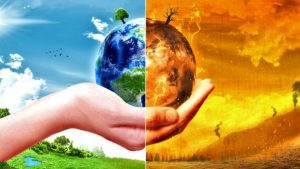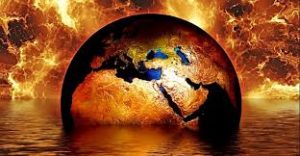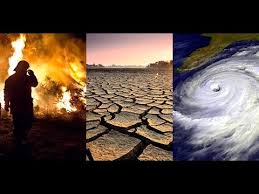Climate Change
INTRODUCTION
Over one and a half centuries ago, humanity has changed the balance of the planet by living beyond its means. Humanity has burnt huge amounts of fossil fuels (such as coal, oil, gas), bred huge amounts of methane- producing livestock and cut down vast swathes of forests, which would naturally absorb carbon dioxide from the air. This has brought a lot of challenges to the world and put humanity and wildlife under threat of existence. This issue has become one of the most important issues being discussed at the United Nations (UN) under United Nations Framework Convention on Climate Change (UNFCCC) that was adopted at the Earth Summit in Rio de Janeiro in 1992 by 154 states, as well as has been included as part of the UN Sustainable Development Goals No. 13 (Climate Action) because of its serious threats to the existence of humanity and wildlife. MUNED being an education and development network is also concern about this issue.
WHAT IS CLIMATE CHANGE ALL ABOUT?

Climate change also called global warming is the rise in average surface temperatures on Earth, mostly due to the burning of fossil fuels, destruction of forest, etc. An overwhelming scientific consensus maintains that climate change is due primarily to the human use of fossil fuels, which releases carbon dioxide and other greenhouse gases into the air. The gases trap heat within the atmosphere, which can have a range of effects on ecosystems, including rising sea levels, severe weather events, and droughts that render landscapes more susceptible to wildfires. Some people have doubted the existence of climate change whereas there is broad-based agreement within the scientific community that climate change is real. The U.S. Environmental Protection Agency, the National Aeronautics and Space Administration, and the National Oceanic and Atmospheric Administration concur that climate change is indeed occurring and is almost certainly due to human activity. With the scientific facts that climate change exists, it is important to know the cause(s). The primary cause of climate change is the burning of fossil fuels, such as oil and coal, which emits greenhouse gases into the atmosphere—primarily carbon dioxide. Other human activities, such as agriculture and deforestation, also contribute to the proliferation of greenhouse gases that cause climate change.
According to Scientists, While some quantities of these gases are a naturally occurring and critical part of Earth’s temperature control system, the atmospheric concentration of CO2 did not rise above 300 parts per million between the advent of human civilization roughly 10,000 years ago and 1900. Today it is at about 400 ppm, a level not reached in more than 400,000 years.
INTERNATIONAL COMBAT AGAINST CLIMATE CHANGE
Giving the threats of climate change to humanity as well as wildlife, the fight against climate change has been internationalized around the world. With the understanding that climate change is mostly human made condition, certain agreements or conventions has been reach by the world leaders through the United Nations systems to seek solutions to the matter. The United Nations Framework Convention on Climates Change (UNFCCC) was adopted at the Earth Summit in Rio de Janeiro in 1992 by 154 states, to which must be added all the members of the European Community . It entered into force on 21 March 1994 . In 2004, it was ratified by 189 countries, in 2015 there are 195 countries. The UNFCCC is the first attempt, within the UN framework , to better understand what climate change is and how to fix it.

The highest body of the UNFCCC is the United Nations Conference on Climate Change, which takes the form of a Conference of the Parties (COP), also the Conference of the Parties serving the meeting of the Parties to the Kyoto Protocol (CMP) and the Conference of the Parties serving as the meeting of the Parties to the Paris Agreement (CMA). It is composed of all States Parties and verifies their proper implementation of the objectives of the Convention. It meets annually at global conferences that analyze the progress of the convention and makes decisions to achieve the goals of combating climate change.
The latest Conference of the Parties are:
- The Bali Conference(COP13) in 2007
- The Poznań Conference(COP14) in 2008
- The Copenhagen Conference(COP15) in 2009
- The Cancún Conference(COP16) in 2010
- The Durban Conference(COP17) in 2011
- The Doha Conference(COP18) in 2012
- The Warsaw Conference(COP19) in 2013
- The Lima Conference(COP20) in 2014
- The 2015 Paris Conference(COP21)
- The Marrakech Conference(COP22) in 2016.
- The Bonn Conference(COP23) in 2017
Apart from climate change being discussed and actions taken at the UN level, Many international and national organizations had been set up to tackle climate change, environmental protection, wildlife protection, etc. One of the very renounced organizations is WWF. WWF clearly admit the existence of climate change and has taken actions to find solutions to it. WWF states that :
“The science is clear. Climate change is real. Climate change is happening now. Climate change requires immediate and ambitious action to prevent the worst effects it can have on people and wildlife all over the world. As the planet continues to warm, climate patterns change. Extreme and unpredictable weather will become more common across the world as climate patterns change, with some places being hotter, some places being wetter, and some places being drier. These changes can have (and are already having) drastic impacts on all life on Earth.”
CLIMATE CHANGE DEBATE

Despite the acceptance among nearly all scientists, scientific organizations, and governments that climate change is happening and is caused by human activity, a small minority of voices questions the validity of such assertions and prefer to cast doubt on the preponderance of evidence. Holders of such views (climate change deniers) often claim that recent changes attributed to human activity can be seen as part of the natural variations in Earth’s climate and temperature, and that it is difficult or impossible to establish a direct connection between climate change and any single weather event, such as a hurricane. While the latter is generally true, decades of data and analysis support the reality of climate change—and the human factor in this process. In any case, economists and the international community agree that acting to reduce fossil fuel emissions would be far less expensive than dealing with the consequences of not doing so.
CONCLUSION
Regardless of the fight against climate change at both international and national levels, many communities in Africa are still to get themselves fully involved in the fight.
A typical example is that of M’muock (Fosimondi) in which vast forests (Mbei Ntow, Mbei Sap, etc) that use to be the home of wildlife like guerrillas, monkeys, tigers, etc. has been systematically destroyed for farming. Thus, MUNED holds the view that for the fight against climate change to be actualized, both international and national organizations must carry the fight to the grassroots communities around the world in which large forests are been systematically destroyed for various reasons rather than focusing only in the industrial and urban areas in the world where fossil fuels are been burned.
